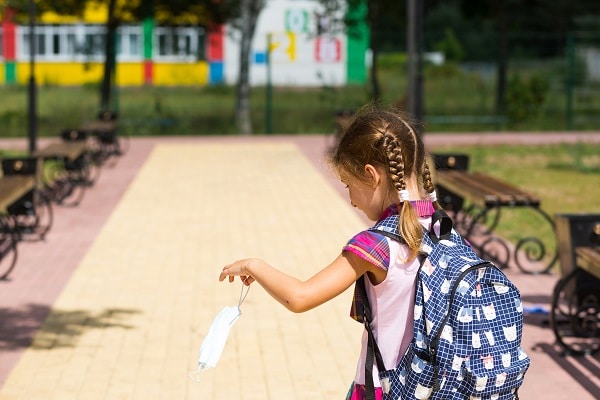The start of the school year commences with most adults weary and wary. Whilst the large rises and subsequent declines in Omicron cases have given some hope that case numbers will continue to fall, parents, educators and students remain concerned.
A conflation of issues
A few issues have combined to create a very uncertain start to the academic year. Disruptions appear inevitable, but accommodation for this possibility has been patchy. Considerations include the effect of disruption on students and their parents if students fall ill; concerns about a smaller number of teachers in schools; and the effect of high Omicron caseloads on teachers, parents, and systems once routine, given that high volume movement and close contact is the norm.
Student illness
It may be predicted that despite moderate but rising vaccine numbers amongst school-aged children, there will be more coronavirus cases affecting young people. This will lead to school disruptions and will directly impact on students. For individual students affected, there will be the inevitable isolation and convalescence – which may be quick, but for others far longer. This alone will impact on student confidence and could also bring a social stigma from immature peers. The public statements have been about the need for school to continue as normal – but whether it is wanted or not, online learning must still be readied.
Educators, parents, and children are generally weary of online learning and so this possibility can lead to resistance and undermine or nullify its effect. Moreover, teachers have not been given extra time to plan for this again. After all, say systems, they should by now be ready, notwithstanding the preparation for face-to-face teaching and learning.
Consequently, should there be high caseloads everything will be predictably re-active rather than pre-readied should issues arise.

Parents are wary. They are uncertain about what will transpire – hopeful but weary. Summer holidays, as an extension of last year, were muted. Parents worry for their children. They wonder how quickly things will return to something ‘normal’ and so they can finally relax. An additional worry is that parents may not have any accumulated leave to look after their own ill child(ren) and may feel work vulnerable.
Vaccines and vaccine concerns
As the rollout includes children of younger ages, the number of concerned parents rises. They see that, although vaccines may ameliorate serious illness, they do not appear to reduce the transmissibility of the Omicron variant. More than one concerned parent has stated to me that they do not want their pre-adolescent children to have the vaccine for fear of what the long-term effects might be. These are not anti-vaxxers, having had all the requisite doses themselves. They are simply concerned and wary parents, responsibly thinking of their children.
READ ALSO: Celebrating the social importance of schools
Fewer teachers
Unvaccinated teachers have been forced out of schools. This has led to a decline in the number of teachers in school and the rise of unvaccinated teachers becoming tutors. The staff problem is compounded as the pipeline for new teachers has been disrupted. This is because the practical experience of trainee teachers was unable to be effectively completed last year and thus fewer trainees are classroom-ready.
Given that 20-30% of different workplaces suffered from staff sickness, before and after Christmas, there is likelihood that high levels of staff sickness will be the norm in Terms 1 and 2. This is a serious issue with fewer teachers available. How will learning be affected by this?
Older teachers
I know of older teachers in schools concerned that there has been no accommodation to timetables to allow them to work online for this term. They are simply expected to work as “new usual” with face masks on, physical distance, the shield of their vaccines and twice weekly RATs. However, Omicron numbers are high across all age groups and with older people most vulnerable. Many teachers have elderly parents and these teachers have not heard from schools how their extended interests are being taken into account. In short, teachers are wary.

Weary
Whether we like it or not, the past two years have taken an emotional toll. Teaching is tiring when there is not the added emotional overlap of worry about self and family. Though there has been a break, the holiday was characterised for many as a time of worry for family and friends due to the high case numbers. Teachers are weary and so are school administrators.
Not enough psychologists in schools
Pre-pandemic there were not enough counsellors and psychologists in schools. At this time more are needed than prior to the pandemic. However, there are fewer available, and the emotional support required, in the absence of systemic support, is now even more necessary. The effect of this is that teachers and students need to rely more on their own resources.
Whilst we all want to celebrate the start of a new year and a fresh beginning, for a while parents and educators need to be disciplined, careful and considered.
At the start of this educational year, a significant proportion of the most important stakeholders are weary and wary.





